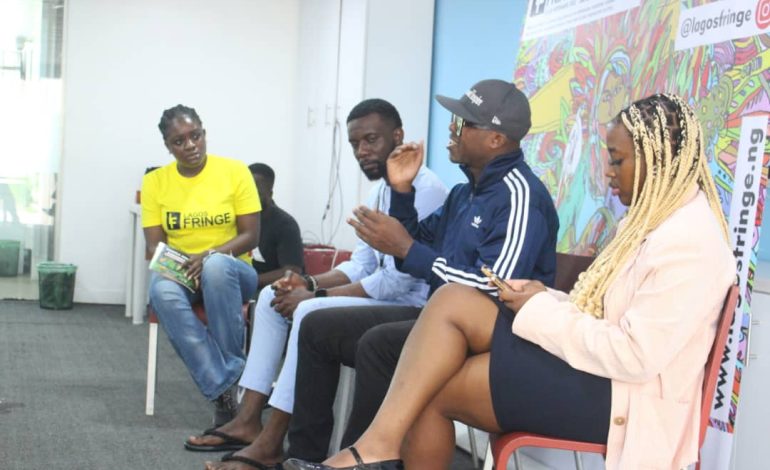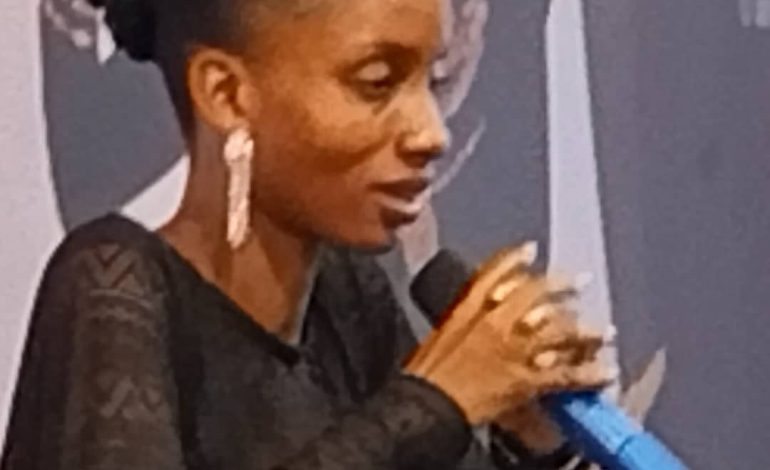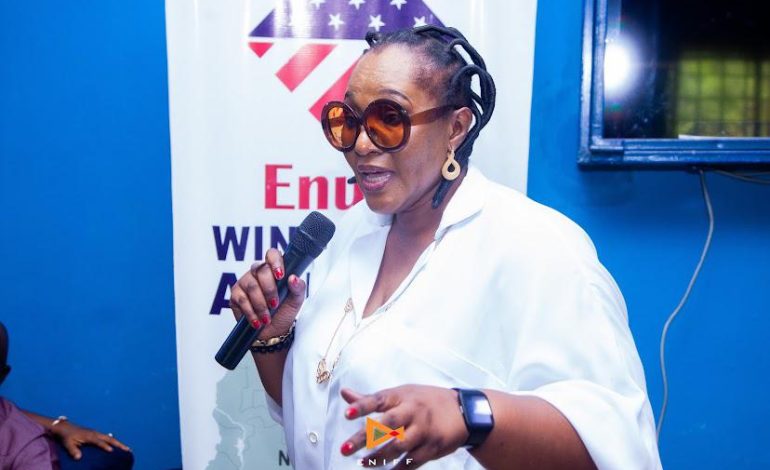Experts harp on skills development for creatives at Lagos Fringe Festival 2023

* ‘The books you read and the people you mix with determine your creative journey’
* ‘Get rid of the box; in fact, there are no boxes for creatives’
* ‘CV is no portfolio; there has to be supporting documentation’
By Anote Ajeluorou
YOUNG creatives who attended ‘The Creative Economy: Skills Development for Africans in Creative Fields’ session at British Council Nigeria office, Lagos, one of the many stimulating masterclasses at this year’s Lagos Fringe Festival 2023, took away valuable knowledge on how to reposition their craft for maximum benefits both to themselves and their communities. The festival is curated by the Kenneth Uphopho-led Pawstudios Africa. The attendees were mostly young creatives, some of them students, who had come to listen and learn from those who had long sunk their teeth in the creative domain and have had sustained and successful careers over the years.
One of the resource persons though is the young CEO and co-founder of Urize, Esther Akpovi, who has been in creative tech and financing environments in the UK, and is returning home to Nigeria to bring a new verve to the creative process and offering tips on how to overcome the challenges of sourcing finance for creative works. Akpovi is looking to make a politically charged film next year, as her first major project to mark her homecoming. Lagos Fringe Festival that ends today, Sunday, November 26, 2023 has as theme ‘What Future For Creatives?: The African Experience.’
The other two resource persons were the Arts Programme Manager for British Council Nigeria, Harry Kesiena and UK-based dance entrepreneur, Artistic Director and founder of Impact Dance, Hakeem Onibudo, who were led in the engaging conversation by the Programme Director of Lagos Fringe Festival, Tope Sani. She also made many interventions by offering personal insights and examples how she has managed her role in the last 10 years, first from not seeing herself as a creative, because she is neither a dancer, writer nor actor. But she has come to a gradual understanding that being a producer – what she is comfortable at – occupies a special place in the creative economy spectrum.
What stands out for Kesiena and Onibudo is that they both have backgrounds in the sciences; Kesiena in petroleum engineering and Onibudo in bio-chemistry, but they found their ways into the arts through passion and have made capital gains out of it. While Kesiena manages arts programmes, Onibudo’s dance company has a studio in central London, having been at it for 28 years and still counting. Although it has been challenging, Onibudo is quick to say a fair ease of sourcing for funds in the UK is a key component of the artistic community that they almost take for granted unlike Nigeria, where it’s almost a zero sum, except the token intervention of Bank of Industry that serves less than one per cent of industry needs.
And he offered, “In 1995 I started a hiphop class. 28 years later, I didn’t know I would have a dance studio in central London. So, the journey has been incredible. It’s about empowering people; it has been inspirational.”

Programme Director for Lagos Fringe Festival and moderator, Tope Sani (left); Arts Programme Manager for British Council Nigeria, Harry Kesiena; Artistic Director for Impact Dance, UK, Hakeem Onibudo and CEO and co-founder of Uprize, UK, Esther Akpovi on the session on ‘The Creative Economy: Skills Development for Africans in Creative Fields’
Onibudo offered a series of nuggets on personal development that most young creatives take for granted or even totally ignore, when he said, “Where you’d be in the next five years is determined by the books you read and the people you mix with!” Which speaks to the twin benefits of equipping oneself through reading or studying to be ready and the inter-personal connections a young person needs to get on. And by connections, Onibudo hinted at the benefits of volunteerism for young creatives, who he cautioned not to always seek benefits from people they meet, but rather to offer assistance on pro bono basis. He said such voluntary assistance usually opens doors unexpectedly, saying kindness shown or offered without being asked usually has multiplier effects in future.
Akpovi, who also has a background in social activism, while running her tech company and venture capital, stressed the place of UN’s Social Development Goals (SDGs), particularly SDG 4 on quality education and SDG 8, which focuses on decent work and economic growth and the promotion of full and productive employment and decent work for all. She said the term creative economy gained currency since Covid-19, when a broad spectrum of industries fell under the term, adding that technology also helped in giving impetus to the term and its related industries. She further said ‘Createch’, an intersection between creative economy and technology, has since Covid-19 evolved to explain the relationships between how deeply entrenched the two concepts have become.
And for Kesiena, creative economy refers to “the economic value that a person’s intellect can generate; only a specific type of people tap into the creative economy. Creatives need to understand the concept of using their talent to create economic value.”
However, Onibudo restated the narrow and broad categories creative economy could refer in measuring when its social impact is measured both on individuals and their communities at large: “It’s about micro and macro economics. What change can you make in your community with your skill? If I can control what is happening in my micro community to make micro effect, that’s fine. What effects can your creative economy have on the macro economy?”
Kesiena is concerned with the facilitation of the creative process with appropriate platforms as drivers for young talents, adding, “My biggest purpose is to create a platform for African Creatives,” saying that it is what led him to team up with a UK-based kindred spirit to found a company with the aim of connecting creatives in the global divide. It’s why what the British Council system does, he said, is key as it brings creatives from disparate environments together for projects. “The British Council wants to take talents from Nigeria to the UK and also bring creatives here to work. The British Council Nigeria will soon train some 20 filmmakers, and is helping in several ways – giving out its space to creatives, like Lagos Fringe Festival to showcase their works. We realise the need for audiences to see new works by creatives and their talents and where they’re showcasing them, like Pawstudios.”
Kesiena also pointed out some shortcomings confronting most young creatives and why their works do not enjoy as much patronage or support as they should. Such shortcomings range from “lack of visibility, lack of documentation of your work that gives you and your work credibility for patrons and financiers; the British Council only showcases creatives who are visible. Creatives don’t document themselves and their works. A CV is not a portfolio; there has to be supporting documentation. Creatives lack ability to keep proper records also, record keeping in terms finance. Invoicing can be 100 per cent discounted that reduces it to zero per cent, but it’s a record for a financier to see,” and related how a certain high-flying fashion designed failed to join them for a recent African conference in Egypt, because there is no record to show what the designer has been doing; no records, and so couldn’t make the trip.

A cross section of audience and speakers at the session PHOTOS: OLUSEGUN OLALEYE
Onibudo said when young people come to ask for space to showcase their works, what he usually looked out for is the hunger in their belly. And so he usually asks, “Are you hungry enough? Are you visible? What’s the value of your project? Can you articulate your vision for the project and the value for it? What income are you projecting – expenditure and income? You need to learn about Excel Spread Sheet and budgeting. And it doesn’t have to be about profits alone. What’s your portfolio? Show me what you’ve done before. Collaborations and connections cannot be stressed enough. Stay connected with others of like minds. The world is about being ready to take opportunities.”
Akpovi also stressed “sustaining your career long term. Update your press kit or portfolio. Also having a ‘pitch deck’ is key; and there’s resourcefulness creative must have. What’s your ability to add value to somebody’s life? So skills, resourcefulness, storytelling, creativity are key; mental wellness is something to check regularly to know who you are.”
For Onibudo also, networking or connection is key, adding, “when you meet people for the first time, don’t think about transactional conversation. Keep the conversation non-transactional,” as transactional conversations usually puts off many people.
Sani offered that the networking process “has to be organic,” although she related how she recently shot from the hips while preparing for this year’s festival when she was pressed for resources and had to take the first opportunity to ask for help from a corporate contact she met for the first time. Luckily, it came through and the festival got help it needed.
Kesiena advised creatives to have a borderless mindset approach to their work, adding, “I have a borderless mindset. I don’t think I’m a Nigerian. I don’t have to create for Nigeria but the world. On Youtube, there are no gatekeepers. It’s what expands the creative space.”
Onibudo capped the conversation with what is an obvious given but which most creatives give little thought: “Invest in your craft or talent. Your skillset makes all the difference. Accuracy leads to excellence. What’s the quality level, the production level of your work? How’s it comparing with your competitor’s? Don’t think outside the box. Get rid of the box! In fact, there are no boxes to think outside of.”



